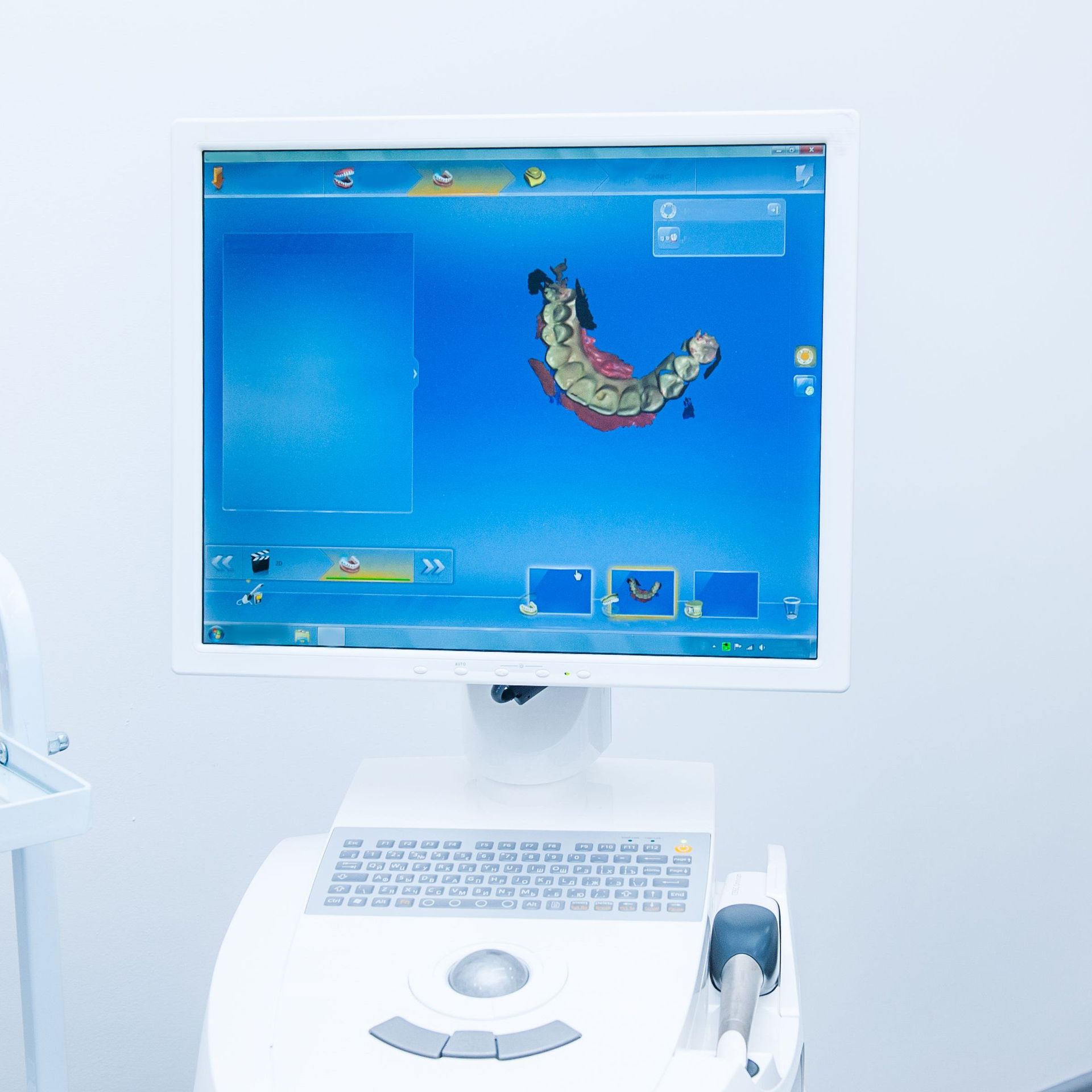
Gluck Orthodontics Discusses the Link Between Allergies and Oral Discomfort
Tips for keeping your smile healthy during peak allergy months
Table of Contents
Introduction
Meet Dr. Joel Gluck and Dr. Jono Gluck
How Allergies Affect Your Oral Health
Common Allergy Symptoms That Impact the Mouth
The Connection Between Allergies, Braces, and Aligners
Dry Mouth During Allergy Season: What to Know
Sinus Health and Oral Discomfort
How to Care for Braces During Allergy Season
Clear Aligner and Clear Tray Care During Allergy Season
Dry Mouth Relief Strategies That Actually Work
Everyday Tips to Protect Your Smile During Allergy Season
Why Choose Gluck Orthodontics in Nashville
Conclusion
Frequently Asked Questions
Introduction
Fall in Nashville
brings cooler weather, football games, and colorful leaves, but for many people, it also brings sneezing, congestion, and itchy eyes. Seasonal allergies can be frustrating enough on their own, but did you know they can also impact your oral health? From dry mouth to sinus pressure, allergies often create discomfort that affects both
braces and
clear aligners.
At
Gluck Orthodontics, we understand that maintaining a healthy smile involves more than just taking care of your teeth. For over 40 years, our team, led by
Dr. Joel Gluck and
Dr. Jono Gluck, has been helping Nashville families understand the full picture of orthodontic health. With more than 1,005 five-star reviews, we are proud to be the trusted choice for
Legendary Smiles in Middle Tennessee.
In this blog, we take a closer look at the link between
allergies and oral discomfort, and share
practical tips for protecting your braces or aligners during peak allergy months.
Meet Dr. Joel Gluck and Dr. Jono Gluck
When it comes to orthodontics in Nashville, our doctors bring a unique blend of experience, innovation, and compassion.
- Dr. Joel Gluck has been serving the Nashville community for decades and is recognized for his expertise, warm approach, and unwavering dedication to patient care.
- Dr. Jono Gluck, continuing the family legacy, brings fresh innovation, advanced training, and a commitment to using the latest orthodontic technologies.
Together, we deliver orthodontic care that combines the wisdom of experience with the excitement of new advancements. Whether you are starting braces, considering clear aligners, or seeking relief from dry mouth during allergy season, our team is here to support you every step of the way.
How Allergies Affect Your Oral Health
Allergies are your body's defense system going into overdrive when exposed to pollen, mold, dust, pet dander, or other airborne irritants. While most people associate itchy eyes, runny noses, and sneezing with allergies, these conditions can also have a surprising impact on your oral health.
At Gluck Orthodontics, we often observe how allergy season presents challenges for our patients who wear braces or aligners. The good news is that once you understand how allergies affect your mouth, you can take steps to reduce discomfort and protect your smile.
Mouth Breathing
When allergies block your nose, it is natural to start breathing through your mouth. Over time, this habit can cause several issues:
- Less saliva flow leads to a dry, uncomfortable mouth.
- Cracked lips and plaque buildup become more common.
- Braces wearers may notice that food and bacteria collect more easily around brackets and wires, making hygiene harder to maintain.
- Aligner wearers often describe a 'dry plastic' feeling, which makes trays less comfortable.
While mouth breathing might feel unavoidable during allergy season, being aware of its effects can help you take extra steps to protect your smile.
Dry Mouth
Saliva is your mouth’s natural defense system—it washes away food particles, neutralizes acids, and helps keep teeth and gums healthy. During allergy season, congestion or antihistamines can reduce saliva flow, leaving your mouth uncomfortably dry. This can lead to:
- A higher risk of cavities
since bacteria are not being rinsed away.
- Persistent bad breath
that feels difficult to control.
- Irritated gums, cheeks, or tongue
from lack of moisture.
- Challenges with aligners, since trays may feel tight or uncomfortable when your mouth is dry.
- Braces concerns, as dry mouth makes food stick more easily around brackets and wires, requiring extra brushing and rinsing.
Staying hydrated and being mindful of these effects can make a big difference in keeping your smile healthy during allergy season.
Swollen Gums
Allergies trigger inflammation throughout your body, and your gums are no exception. When they become swollen or tender, you may notice:
- Braces discomfort, as brackets and wires feel tighter against irritated gum tissue.
- Minor bleeding when brushing or flossing, even if your routine has not changed.
- Aligner irritation, since trays may press against swollen gums and cause soreness.
By keeping up with gentle brushing, rinsing with water, and staying hydrated, you can reduce irritation and keep your gums healthier through allergy season.
Sinus Pressure
Your upper teeth sit directly below your maxillary sinuses, which is why sinus problems often feel like toothaches. During allergy season, sinus swelling or pressure can cause:
- A toothache-like sensation in the upper jaw that may feel alarming but is often sinus-related.
- Chewing discomfort, especially with harder foods.
- Confusion with orthodontic treatment, as patients sometimes mistake sinus pain for issues with braces or aligners.
Using saline rinses, staying hydrated, and monitoring symptoms can ease pressure and help you distinguish between sinus-related discomfort and true orthodontic concerns.
Why This Matters During Orthodontic Treatment
All of these allergy-related issues become more noticeable when you are in treatment with braces or aligners:
- Braces may feel sharper, tighter, or more irritating when gums are swollen.
- Aligners may feel uncomfortable when dry mouth or sinus pain is at its peak.
- Oral hygiene routines may be harder to maintain when you are congested or feeling unwell.
That is why understanding the connection between allergies and oral health is so important. By recognizing these symptoms early, you can take simple steps, such as staying hydrated, rinsing with water more frequently, or using a humidifier at night, to protect your teeth, gums, and appliances while keeping your smile on track.
Common Allergy Symptoms That Impact the Mouth
When allergy season hits, your body produces histamines that trigger a chain reaction. Here are some of the most common oral symptoms we see in our patients:
- Dry Mouth: Congestion causes you to breathe through your mouth more frequently, thereby reducing saliva flow.
- Tooth and Jaw Discomfort: Sinus pressure can cause your upper teeth to ache, especially near their roots.
- Swollen Gums: Inflammation from allergies can irritate gum tissue, especially around braces.
- Bad Breath: A combination of dry mouth and post-nasal drip can lead to persistent bad breath.
- Irritated Throat: Mucus buildup may cause sore throats, which can affect oral comfort.
Knowing what to expect helps you manage these issues before they interfere with your orthodontic treatment.
The Connection Between Allergies, Braces, and Aligners
Braces and aligners make your smile more beautiful, but they also require extra care when allergies flare up.
- Braces and Allergies: Swollen gums from allergies can make braces feel tighter or more uncomfortable. Food particles may also stick more easily when dry mouth reduces saliva flow.
- Aligners and Allergies: Clear trays cover your teeth fully, so any dryness or irritation may feel magnified. If you have sinus pressure, wearing aligners can sometimes make upper jaw discomfort more noticeable.
The good news? With a few small adjustments, you can keep your treatment on track and maintain a healthy smile.
Dry Mouth During Allergy Season: What to Know
Dry mouth is one of the most common—and frustrating—side effects of allergy season. Saliva plays a crucial role in washing away food particles, neutralizing acids, and maintaining the health of your teeth.
Without enough saliva, you may experience:
- Increased cavity risk
- Bad breath
- Mouth sores or irritation
- Difficulty wearing clear aligners comfortably
Why Does Dry Mouth Happen?
- Antihistamines: While effective for allergy relief, these medications can reduce saliva production.
- Mouth Breathing: Blocked nasal passages force more air through your mouth, which can cause it to dry out.
- Dehydration:
Allergy season often coincides with the warmer months, when hydration is most crucial.
Sinus Health and Oral Discomfort
Your sinuses and upper teeth are closely connected. When allergies cause your sinuses to swell or fill with pressure, it can create pain that feels like a toothache. Many patients worry about cavities or braces issues when it is really sinus-related discomfort.
Our advice:
- Use saline rinses or a humidifier to keep your sinuses clear.
- Stay hydrated to thin mucus buildup.
- See a doctor if sinus pain lingers beyond typical allergy symptoms.
Understanding this connection can prevent unnecessary worry during orthodontic treatment.
How to Care for Braces During Allergy Season
Allergy symptoms may make it more challenging to maintain good oral hygiene, but consistency is key.
Our team recommends:
- Brushing after every meal to keep plaque from building up around brackets.
- Using fluoride toothpaste and mouthwash to strengthen enamel.
- Drinking more water to combat dry mouth.
- Keeping orthodontic wax handy for irritated gums.
- Scheduling a quick check-up with us if braces feel unusually uncomfortable.
Even during peak allergy months, these small steps keep your braces journey on track.
Clear Aligner and Clear Tray Care During Allergy Season
If you are wearing Invisalign or other clear trays, allergy season may bring some unique challenges:
- Always rinse your trays with cool water before returning them if you have been coughing or experiencing post-nasal drip.
- Brush aligners gently with clear, fragrance-free soap to avoid buildup from mucus or saliva changes.
- Store trays in their case when not in use—never wrap them in tissues, which can spread allergens.
- Stay consistent with wear time (20–22 hours daily), even when discomfort from allergies makes it tempting to skip.
Our team can also provide cleaning crystals and tips for keeping your aligners fresh during allergy season.
Dry Mouth Relief Strategies That Actually Work
Managing dry mouth can make a huge difference in both comfort and oral health.
Here are our favorite strategies:
- Hydrate Often: Sip water regularly throughout the day to stay hydrated.
- Sugar-Free Gum: Stimulates saliva flow and keeps breath fresh.
- Xylitol Products: Gum or lozenges with xylitol can reduce cavity risk.
- Humidifier at Night: Adds moisture to the air, helping with mouth breathing.
- Limit Caffeine and Alcohol: Both can worsen dry mouth.
- Over-the-Counter Sprays or Rinses: Specialized dry mouth products can provide quick relief.
We encourage our patients to experiment with these options to find what works best for them.
Everyday Tips to Protect Your Smile During Allergy Season
Allergies may not be avoidable, but protecting your smile is possible.
Here are everyday tips we share with our Nashville patients:
- Wash pillowcases and sheets weekly to reduce pollen exposure.
- Shower before bed to remove allergens from your hair and skin.
- Avoid outdoor activities during peak pollen times.
- Continue wearing retainers or aligners as directed, even if symptoms flare.
- Contact our office if allergy-related discomfort is disrupting your orthodontic progress.
Why Choose Gluck Orthodontics in Nashville
At Gluck Orthodontics, we believe a healthy smile means looking at the whole picture, including how seasonal allergies impact your comfort.
Families across Nashville choose us because:
- We have been serving the community for over 40 years.
- Our doctors, Dr. Joel Gluck and Dr. Jono Gluck, combine expertise and innovation.
- We offer a range of options, from traditional braces to clear aligners, tailored to meet your specific needs.
- Our team supports you with tips and solutions for challenges like allergies and dry mouth.
- We are proud to have earned over 1,005 five-star reviews from satisfied patients.
When you join our practice, you are not just straightening teeth—you are joining a family that truly cares about your comfort and long-term health.
Conclusion
Seasonal allergies may be a nuisance, but they do not have to derail your orthodontic treatment. By understanding how allergies affect your mouth, making informed adjustments to your braces or aligner care, and following dry mouth relief strategies, you can maintain a healthy smile throughout the year.
At Gluck Orthodontics, we are more than orthodontists—we are your partners in creating Legendary Smiles, even during fall allergy season. Our team is here to answer your questions, support your care, and make sure your braces or aligner journey stays on track.
📍 Located in Nashville, TN
📞 Call and text us at 615-269-5903
🌐 Visit
drgluck.com to schedule your consultation today.
Let's keep your smile healthy, strong, and allergy-proof this season.
Frequently Asked Questions
Can allergies really cause tooth pain?
Yes. Sinus pressure from allergies often radiates into the upper teeth, causing discomfort that feels like a toothache.
Do antihistamines make dry mouth worse?
They can. Antihistamines reduce histamines that cause allergy symptoms, but they may also reduce saliva flow.
How do I clean my aligners during allergy season?
Rinse often, brush gently with clear soap, and use cleaning crystals for deeper refreshes. Always store trays in their case.
What if my gums feel swollen when I have allergies?
Brush carefully, stay hydrated, and call our office if swelling persists. We can ensure your braces or aligners continue to fit comfortably.
Should I stop orthodontic treatment if allergies make me uncomfortable?
No. With proper care and adjustments, you can stay on track. Our team will guide you through strategies to ensure your treatment progresses smoothly.












